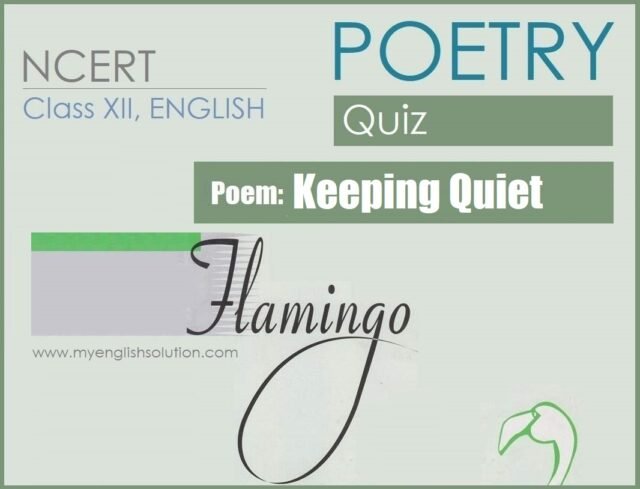| . |

| About the Poet |
| Pablo Neruda (1904 –1973) was a Chilean poet-diplomat and politician who won the 1971 Nobel Prize in Literature. Neruda became known as a poet when he was 13 years old, and wrote in a variety of styles, including surrealist poems, historical epics, political manifestos, a prose autobiography, and passionate love poems. Pablo Neruda is one of the most influential and widely read 20th-century poets of the Americas. |
| About the Poem |
| The poem Keeping Quiet is basically an anti-war poem. The poet is deeply concerned about violence, cruelty and plight of manual workers. The poet offers a very simple solution to many of our social, political and religious problems. The solution is self-introspection. Neruda speaks of a world of wisdom in a calm fashion and with much serenity. |
| Poem |
| Now we will count to twelve and we will all keep still. . For once on the face of the Earth let’s not speak in any language, let’s stop for one second, and not move our arms so much. . It would be an exotic moment without rush, without engines, we would all be together in a sudden strangeness. . Fishermen in the cold sea would not harm whales and the man gathering salt would look at his hurt hands. . Those who prepare green wars, wars with gas, wars with fire, victory with no survivors, would put on clean clothes and walk about with their brothers in the shade, doing nothing. . What I want should not be confused with total inactivity. Life is what it is about; I want no truck with death. If we were not so single-minded about keeping our lives moving, and for once could perhaps a huge silence might interrupt this sadness of never understanding ourselves and of threatening ourselves with death. . Perhaps the Earth can teach us as when everything seems dead and later proves to be alive. . Now I’ll count up to twelve and you keep quiet and I will go. |
Other Poems:
| My Mother at Sixty-six |
| An Elementary School Classroom in Slum |
| A Thing of Beauty |
| A Roadside Stand |
| Aunt Jennifer’s Tigers |
also see:
| ONLINE GRAMMAR QUIZZES with CERTIFICATES |
| CBSE: Curriculum Aligned Competency-Based Test Items | EduDel Practice Papers for Class 3 to Class 8: 2022-23 |
| ENGLISH GRAMMAR_1 | ENGLISH GRAMMAR_2 |
| USEFUL EXPRESSIONS IN ENGLISH SPEAKING |


















































